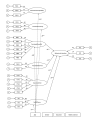Adoption of a Contact Tracing App for Containing COVID-19: A Health Belief Model Approach
- PMID: 32755882
- PMCID: PMC7470174
- DOI: 10.2196/20572
Adoption of a Contact Tracing App for Containing COVID-19: A Health Belief Model Approach
Abstract
Background: To track and reduce the spread of COVID-19, apps have been developed to identify contact with individuals infected with SARS-CoV-2 and warn those who are at risk of having contracted the virus. However, the effectiveness of these apps depends highly on their uptake by the general population.
Objective: The present study investigated factors influencing app use intention, based on the health belief model. In addition, associations with respondents' level of news consumption and their health condition were investigated.
Methods: A survey was administered in Flanders, Belgium, to 1500 respondents, aged 18 to 64 years. Structural equation modeling was used to investigate relationships across the model's constructs.
Results: In total, 48.70% (n=730) of respondents indicated that they intend to use a COVID-19 tracing app. The most important predictor was the perceived benefits of the app, followed by self-efficacy and perceived barriers. Perceived severity and perceived susceptibility were not related to app uptake intention. Moreover, cues to action (ie, individuals' exposure to [digital] media content) were positively associated with app use intention. As the respondents' age increased, their perceived benefits and self-efficacy for app usage decreased.
Conclusions: Initiatives to stimulate the uptake of contact tracing apps should enhance perceived benefits and self-efficacy. A perceived barrier for some potential users is privacy concerns. Therefore, when developing and launching an app, clarification on how individuals' privacy will be protected is needed. To sustain perceived benefits in the long run, supplementary options could be integrated to inform and assist users.
Keywords: COVID-19; SARS-CoV-2; contact tracing; health belief model; privacy; proximity tracing.
©Michel Walrave, Cato Waeterloos, Koen Ponnet. Originally published in JMIR Public Health and Surveillance (http://publichealth.jmir.org), 01.09.2020.
Conflict of interest statement
Conflicts of Interest: None declared.
Figures
Comment on
-
Peer-to-Peer Contact Tracing: Development of a Privacy-Preserving Smartphone App.JMIR Mhealth Uhealth. 2020 Apr 7;8(4):e18936. doi: 10.2196/18936. JMIR Mhealth Uhealth. 2020. PMID: 32240973 Free PMC article.
References
-
- Yasaka TM, Lehrich BM, Sahyouni R. Peer-to-Peer Contact Tracing: Development of a Privacy-Preserving Smartphone App. JMIR Mhealth Uhealth. 2020 Apr 07;8(4):e18936. doi: 10.2196/18936. https://mhealth.jmir.org/2020/4/e18936/ - DOI - PMC - PubMed
-
- Abeler J, Bäcker Matthias, Buermeyer U, Zillessen H. COVID-19 Contact Tracing and Data Protection Can Go Together. JMIR Mhealth Uhealth. 2020 Apr 20;8(4):e19359. doi: 10.2196/19359. https://mhealth.jmir.org/2020/4/e19359/ - DOI - PMC - PubMed
-
- Ekong I, Chukwu E, Chukwu M. COVID-19 Mobile Positioning Data Contact Tracing and Patient Privacy Regulations: Exploratory Search of Global Response Strategies and the Use of Digital Tools in Nigeria. JMIR Mhealth Uhealth. 2020 Apr 27;8(4):e19139. doi: 10.2196/19139. https://mhealth.jmir.org/2020/4/e19139/ - DOI - PMC - PubMed
-
- Cheng W, Hao C. Case-Initiated COVID-19 Contact Tracing Using Anonymous Notifications. JMIR Mhealth Uhealth. 2020 Jun 22;8(6):e20369. doi: 10.2196/20369. https://mhealth.jmir.org/2020/6/e20369/ - DOI - PMC - PubMed
-
- Wang S, Ding S, Xiong L. A New System for Surveillance and Digital Contact Tracing for COVID-19: Spatiotemporal Reporting Over Network and GPS. JMIR Mhealth Uhealth. 2020 Jun 10;8(6):e19457. doi: 10.2196/19457. https://mhealth.jmir.org/2020/6/e19457/ - DOI - PMC - PubMed
Publication types
MeSH terms
LinkOut - more resources
Full Text Sources
Medical
Research Materials
Miscellaneous


